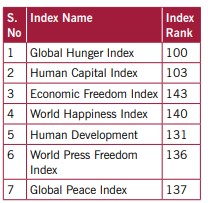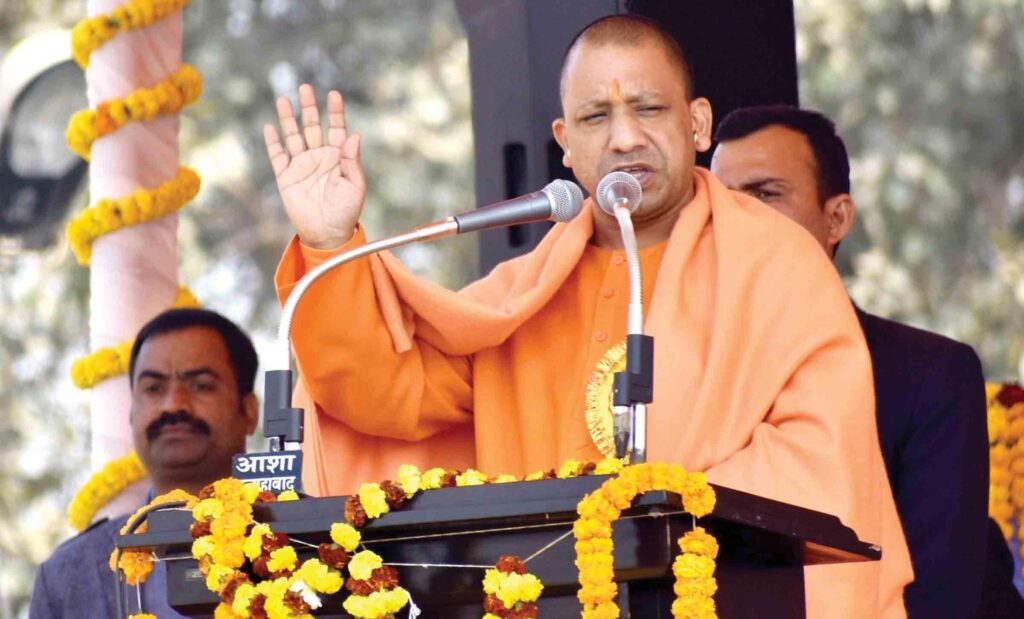The Context
THE crawling process to elect the 17th Lok Sabha is nearing completion. Political parties are working overtime to capture power and manage India’s democracy and all that it entails. Ironically, since India became a democratic Republic it is these political parties that have diminished democracy, abandoned liberty, inclusiveness and justice, encouraged polarisation, promoted crony capitalism and pursued predatory policies and projects that has made India among the most unhappy and inequitable countries in the world.
Years ago (2004), a leading magazine described the state of India’s political system thus: “They all sound like Louis XV of France-Après moi le deluge. Beyond the leader, there is nothing but his/her shadow—or his/her family. Indian politics is fast evolving into a singular story, biologically at least, in which the paranoid helmsman/woman has become the least democratic entity in one of the world’s most volatile democracies. He/she is the party. He/she is the policy. He/she is the ideology. Across the political spectrum the heir is no longer apparent, unless he/she is a genetic extension of the paramount leader. It is not the Congress story alone. Rather it is the colonisation of the Congressism.…
In India’s Grand Old Party, it has always been the case: politics as a family enterprise, with the faithful looking up to the only Leader who could deliver. It is a party defined by the temptations of the Dynasty…. In Sonia Gandhi’s Congress, the next big question is a single one: who is the next Gandhi? Leaders with other mundane surnames are too servile to complain.
In the merciless heartland, the politics of social justice—call it Mulayam or Laloo—has become one leader vaudeville with family as the supporting cast. From the Abdullahs and Muftis in Kashmir to the Karunanidhi clan in Tamil Nadu, the scenario is more or less the same, with minor cultural variation in the script. Between J Jayalalithaa and her cardboard double, there is no space for another leader to make an appearance; there are only eternal submissions….
It is the age of the chosen leader, not the elected leader. The fear of the unknown and the instinct of survival ensure that the chosen one chooses the family—or divides and rules. Ideology is dead. And ideas are far from leader’s mind. The alternative to the leader is the leader himself/herself. The next leader in any of the political parties in India won’t be chosen by inner-party democracy, but by ancestry or desperation. After all democracy is such a wonderful thing—as long as it is not applied in-house.”
As would be seen, there is no shred of democracy in the political set-up from which ‘leaders’ are elected. This is because political parties in India are just ‘loose-cannons’ without constitutional mandate or legislative rigour. Such lawless and rule-less entities lording over the legally established and rule-bound constitutional and statutory institutions is our worst misfortune. How then can we call ourselves a democracy with democratic governance?
IN the following years India’s political system has deteriorated further with democracy yielding place to kleptocracy and then to an autocratic oligarchy. The political alternative that emerged subsequently and captured power at the centre and several states has turned out to be even worse. In the event, India’s First Republic is suffering from the trauma of ‘multi-organ’ failure.
This is evident from the dismal rank India has in the Global Index of almost all the critical parameters (2018/2019).

What is equally worse, the ‘development model’ being pursued is so vulgar that 52 per cent of the money government spends and the wealth India generates goes to the super-rich (1 per cent), 25 per cent to the rich (10 per cent), 18 per cent to the middle class (29 per cent) and 5 per cent to the poor (60 per cent). In 2018 alone, the transfer of wealth to the super-rich amounted to `2,200 crore per day i.e. a mind-boggling `8 lakh crore in a year! Can crony-capitalism be any worse?
AT this rate India would soon enough fit into the description of ‘Failed State’ by Robert Rotberg in his seminal Book, “When States Fail: Causes and Consequences”:
“Failed states offer unparalleled economic opportunity—but only for a privileged few. Those around the ruler or ruling oligarchy grow richer while their less fortunate brethren starve. Immense profits are available from an awareness of regulatory advantages and currency speculation and arbitrage. But the privilege of making real money when everything else is deteriorating is confined to clients of the ruling elite….The nation-state’s responsibility to maximize the well-being and prosperity of all its citizens is conspicuously absent, if it ever existed…. Corruption flourishes in many states, but in failed states it often does so on an unusually destructive scale. There is widespread petty or lubricating corruption as a matter of course, but escalating levels of venal corruption mark failed states.”
Have Parliaments represented the People?
As per the preamble of the Constitution of India ‘We, the People’ may be its keepers. But it is our elected representatives to Parliament with all power, perks and authority who are to do this. Their task is to uphold for us and on our behalf Justice, social, economic and political; Liberty of thought, expression, belief, faith and worship; Equity of status and of opportunity and to promote among them all Fraternity assuring the dignity of the individual and the unity and integrity of the Nation. Today, these core values stand severely diminished and devastated. It is evident that Parliaments have not performed their tasks and therefore have not truly represented the People.
What then should be the agenda for the 17th Lok Sabha:
Freedom, Liberty and Human Security
Our Republic is founded on the democratic principles of liberty and freedom. This was resoundingly brought home by Jayaprakash Narayan (JP) in 1975 when Indira Gandhi imposed Emergency saying ‘bread is more important than freedom’. JP responded thus: “Freedom with the passing of years transcended the mere freedom of my country and embraced freedom of man everywhere and from every sort of trammel-above all it meant freedom of the human personality, freedom of the mind, freedom of the spirit…..I shall not see it compromised for bread, for security, for prosperity, for the glory of the state or for anything else”.
The ‘development model’ being pursued is so vulgar that 52 per cent of the money government spends and the wealth India generates goes to the super-rich (1 per cent), 25 per cent to the rich (10 per cent), 18 per cent to the middle class (29 per cent) and 5 per cent to the poor (60 per cent)
This is the kind of freedom that India needs and for this purpose all institutions and instruments of governance should be reconfigured and activated to implement the constitutional rights and liberties in letter and spirit. Human security built around such a concept of liberty and freedom should replace the present farce of national security pursued through arbitrary means. For this all freedom-killing laws should be scrapped/ repealed forthwith even if they had been upheld by pliable courts. National and State Human Rights Commissions should seriously address themselves to protecting human rights and dignity.

Justice—Accessible and Affordable
“No man will dare to come to the Supreme Court. Only those who have `50 crore, or `100 crore or `200 crore can come to the court. Why Supreme Court, it would even be difficult for them to approach the Munsif court.” This was the obiter dicta of a three-judge bench of the Supreme Court of India some years ago.
Added to this, the arbitrary and authoritarian way the highest court of the land is functioning is scaring the common man from even approaching these courts for justice. It looks as if India’s higher judiciary, which adjudicates every law and rule in the country, is itself functioning without any law or rule!
Though the Constitution has placed “Justice, social, economic and political” at the epicentre of India’s democratic governance, for the people at large this has become a rare, time-consuming costly and scary thing to access. And the way courts and judges are functioning things are going from bad to worse. This cannot be countenanced and a solution has to be found. The sooner, the better because higher judiciary cannot be a rule-less entity in perpetuity! First thing to do is to establish Regional Circuit Courts to make justice accessible and affordable and convert the existing Supreme Court in Delhi as just constitutional court.
Restructure the Polity to make it truly democratic
Democracy stands whittled and diminished due to extreme centralisation/ concentration of power and authority. We have an all-powerful Parliament and Central Government; a limited power State government and Legislature and no-power Panchayats and Urban Local Bodies. Democracy sans foundation has led to non-governance and rise of kleptocratic oligarchy. This needs to be set right and grassroots democracy firmly re-established by stringent implementation of 73rd and 74th Constitutional Amendments. Appropriate law to regulate political parties should also be enacted immediately.
Reinforce Instruments of Governance to combat corruption and black-money
Corruption—episodic, extortionist and endemic—and huge black money being laundered back as FDI is a standing symptom of weak leadership and rotten governance. India has several institutions and instruments of governance—CAG, CVC, CBI, ED—to act as bulwarks against these evils. These need to be strengthened, made truly autonomous and headed by men/women of unimpeachable integrity so that they function as institutions/ instruments with independence to combat the cancer of corruption effectively.

Electoral Integrity to create level playing field
Electoral corruption is the mother of all corruption that destroys the very fabric of democracy and integrity in governance. Long-pending Electoral Reforms should be legislated immediately so that criminal and corrupt elements are ruthlessly weeded out from the electoral process to create a level playing field for facilitating bright, young and honest leadership to emerge to take the nation from darkness to light. Better still would be the repeal of the moth-eaten Representation of Peoples Act 1951 and enact an altogether fresh law after widespread public consultation. On priority should be to make the Election Commission truly autonomous.
India’s political system has deteriorated further with democracy yielding place to kleptocracy and then to an autocratic oligarchy. The political alternative that emerged subsequently and captured power at the centre and several states has turned out to be even worse. In the event, India’s First Republic is suffering from the trauma of ‘multi-organ’ failure
People’s Economy, not Predatory Economics
IN Mahatma Gandhi’s vision, Independent India would be sui generis, a society unlike any other, in a class of its own and would not follow the Western pattern of industrialisation, urbanisation and individuation. India’s would be a people’s economy that would chart out a distinct course in economic development. Instead of the predatory economics of gigantic development projects and large-scale industry and mining—typical of market-led growth under capitalism—India would pursue need-based, human-scale, balanced development while conserving nature and livelihoods. In a self-respecting nation, citizens should get the strength, resource and opportunity to stand on their feet and earn their livelihood with honour and dignity instead of endlessly depending on corporate trickle-downs and government charity. God-given resources-land, water, jungle and minerals–belong to the people and not corporate carpetbaggers. This should be ensured.
Youth Forward
Inaugurating the first conference of chairpersons of district planning committees in January 2009, then Prime Minister Manmohan Singh talked of the aspiration of “a large, young and restless nation” which constitute the ‘demographic dividend’ India is blessed with. Aspiration of the ‘restless youth’ cannot be fulfilled through FDIs, GDPs and orchestrated ‘Reforms’ that has only triggered a commercial and commodified educational system. Under this dispensation, youth have been reduced to MNC job-dependant zombies with hardly any outlet or opportunity for excellence, sports achievements or creative thinking. This should change and something ‘much beyond’ is needed—a holistic approach and strategy to resurge India’s youth to give then an identity, pride and purpose.
Rural Rejuvenation
At the dawn of Independence, India was a nation of small artisans, small farmers, small industries and small traders. Today, this grassroots entrepreneurial economy lies shattered because of Government’s pro-rich predatory policies and practices. This economy should be rejuvenated by making available the resources, infrastructure, facilities and funds for small/medium farmers and entrepreneurs to stand on their feet and prosper, instead of being servile to alien and MNC interests and big business. Innovative policy regime should be put in place for the unorganised (Informal) economy sector which covers over 90% of working population. In short India’s rural economy should be transformed into a ‘Small-Farmer-Small-Business driven Resource-based-Entrepreneurial Economy’.
Reinventing the Civil Service
If governance is to be brought on even keel, civil servants should revert back to the constitutional scheme of things from which they have drifted and reinvent themselves to become a fearless, independent, honest and efficient entity bound by an esprit de corps which is absent now. For this the colonial and neo-colonial hang-overs such as ‘bureaucratic gagging’, ‘subservience to political masters’, ‘too much protection’ as well as the culture of ‘jack-of-all-trade’ should be done away with. Also, to be discarded are obnoxious practices like clannish inbreeding and servile sinecures-hunting.

Restoring the honour of our Armed Forces
ARMED Forces of the Union are moored on the anchor of honour and integrity and therefore has to be absolutely apolitical. In recent times this has been ruthlessly compromised in the altar of political rent-seeking and election propaganda. Let us see some of these:
• Images of the dead CRPF jawans used as a backdrop on the stage for a political rally.
• A former Chief Minister openly counts his Parliament seats along with the dead soldiers and a present Chief Minister calls Indian Army as “Modi’s Sena.”
• A captured pilot is used to build up an election pitch.
• Prime Minister Modi himself make ghastly pun on the word “pilot” to buttress his warrior credentials. And he invokes the youth to cast their votes for his party in memory of Pulwama and Balakot!
• The President of a BJP state unit has the temerity to don an army uniform while campaigning for votes.
• The Defence Minister robs the Airforce of its due credit by stating that the air strike was “not a military operation.”
With such blatant rent-seeking from the Armed Forces where is their honour and integrity? It is imperative that these are redeemed and restored with utmost expedition.
These are tasks cut out for the Lok Sabha which is called the ‘House of the People’. But with aspiring criminals, moneybags, sycophants, communalists, bigots, hate-mongers and terror-accused entering this ‘House’ will it ever be that of the People? That is the trillion-dollar question!!
Writer is a former Army and IAS Officer


























































